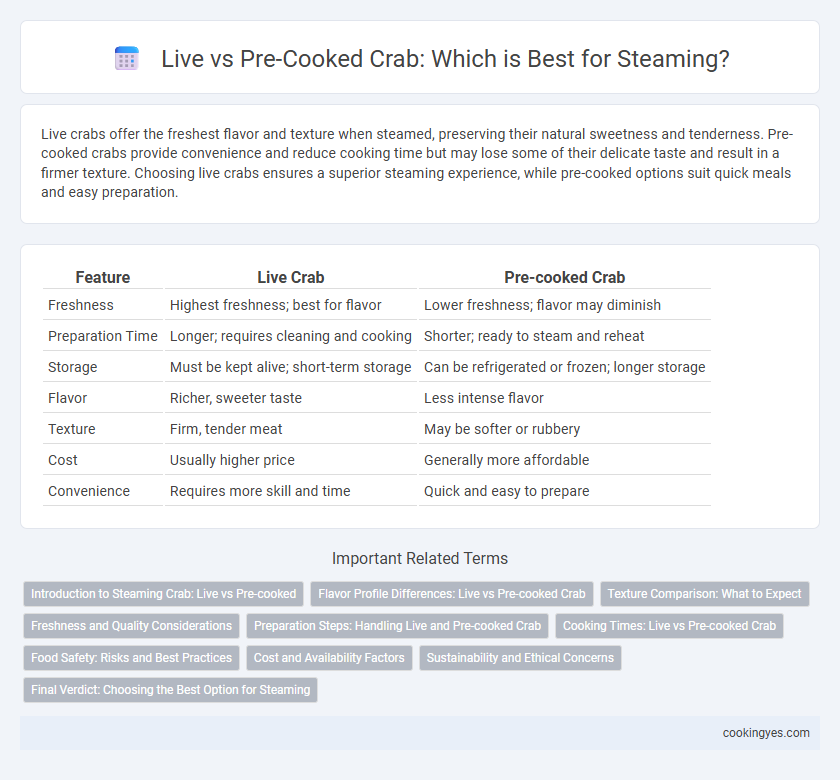Live crabs offer the freshest flavor and texture when steamed, preserving their natural sweetness and tenderness. Pre-cooked crabs provide convenience and reduce cooking time but may lose some of their delicate taste and result in a firmer texture. Choosing live crabs ensures a superior steaming experience, while pre-cooked options suit quick meals and easy preparation.
Table of Comparison
| Feature | Live Crab | Pre-cooked Crab |
|---|---|---|
| Freshness | Highest freshness; best for flavor | Lower freshness; flavor may diminish |
| Preparation Time | Longer; requires cleaning and cooking | Shorter; ready to steam and reheat |
| Storage | Must be kept alive; short-term storage | Can be refrigerated or frozen; longer storage |
| Flavor | Richer, sweeter taste | Less intense flavor |
| Texture | Firm, tender meat | May be softer or rubbery |
| Cost | Usually higher price | Generally more affordable |
| Convenience | Requires more skill and time | Quick and easy to prepare |
Introduction to Steaming Crab: Live vs Pre-cooked
Steaming live crab preserves its natural sweetness and ensures maximum freshness, as the meat remains tender and juicy throughout the cooking process. Pre-cooked crab offers convenience and reduced cooking time but may result in slightly less flavorful meat due to prior thermal processing. Choosing between live and pre-cooked crab depends on balancing optimal taste and preparation efficiency for steaming.
Flavor Profile Differences: Live vs Pre-cooked Crab
Live crab offers a superior, natural sweetness and delicate texture that intensifies when steamed, preserving the crab's original flavor complexity. Pre-cooked crab often has a saltier, less nuanced taste due to prior processing and refrigeration, which can diminish the freshness and subtle brininess characteristic of live specimens. Steaming live crab enhances its rich umami notes and succulence, making it the preferred choice for optimal flavor experience.
Texture Comparison: What to Expect
Live crab offers a firmer, sweeter texture due to the freshness preserved before cooking, while pre-cooked crab can be softer and sometimes rubbery because of the initial cooking process. Steaming live crab results in meat that is tender yet slightly chewy, providing a more authentic seafood experience. Pre-cooked crab, when steamed, may lose some of its natural juices, leading to a less vibrant texture.
Freshness and Quality Considerations
Live crabs ensure optimal freshness and superior texture, delivering a sweet, delicate flavor that is often diminished in pre-cooked varieties. Pre-cooked crabs offer convenience but may suffer from moisture loss and altered taste due to storage and reheating processes. For the highest quality steaming experience, selecting live crabs guarantees a fresher, more flavorful outcome.
Preparation Steps: Handling Live and Pre-cooked Crab
Handling live crab for steaming requires careful preparation, including rinsing under cold water and securing the claws to prevent injury before placing it in the steamer. Pre-cooked crab only needs reheating, so it is typically rinsed and then placed directly in the steamer for a shorter duration to maintain flavor and texture. Proper handling ensures food safety and optimal taste whether starting from live or pre-cooked crab.
Cooking Times: Live vs Pre-cooked Crab
Live crabs require approximately 15-20 minutes of steaming to ensure thorough cooking, while pre-cooked crabs need only 5-10 minutes to reheat without overcooking. Steaming live crabs preserves natural moisture and flavor, making precise timing crucial to avoid undercooking or toughness. Pre-cooked crabs offer convenience with shorter steaming times, ideal for quick meals or when flavor infusion is less critical.
Food Safety: Risks and Best Practices
Live crab ensures freshness but requires careful handling to prevent bacterial contamination, including proper chilling and immediate cooking after purchase. Pre-cooked crab reduces the risk of foodborne illness since it has been cooked before packaging, yet it must be thoroughly reheated to an internal temperature of 165degF (74degC) to eliminate any potential pathogens. Best practices for steaming involve using clean equipment, avoiding cross-contamination, and maintaining proper hygiene to ensure safe consumption.
Cost and Availability Factors
Live crabs generally cost more due to higher handling and transportation requirements, while pre-cooked crabs offer more affordable pricing and longer shelf life, enhancing their availability in various markets. Availability fluctuates seasonally with live crabs being harder to source out of peak seasons, whereas pre-cooked crabs maintain consistent supply throughout the year. Consumers aiming for convenience and budget-friendly options often prefer pre-cooked crabs, whereas live crabs are sought for freshness and superior taste.
Sustainability and Ethical Concerns
Live crabs offer a fresher product but raise ethical concerns related to the stress and potential suffering during transportation and cooking. Pre-cooked crabs contribute to sustainability by reducing waste and energy consumption in seafood processing, with lower risk of spoilage and the use of more efficient packaging. Choosing pre-cooked crabs can support more humane practices and environmentally conscious seafood consumption.
Final Verdict: Choosing the Best Option for Steaming
Live crab retains maximum freshness and natural sweetness, making it the superior choice for steaming enthusiasts seeking optimal flavor and texture. Pre-cooked crab offers convenience with reduced cooking time but may sacrifice some taste and moisture quality. For the best steamed crab experience, live crab is recommended to ensure a vibrant, succulent meal.
Live vs Pre-cooked Crab for steaming Infographic

 cookingyes.com
cookingyes.com